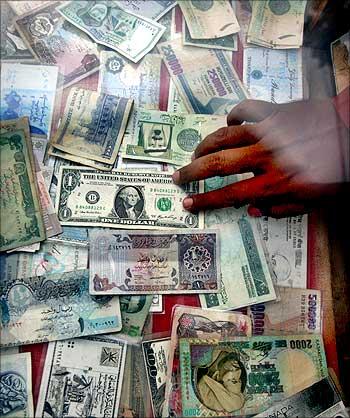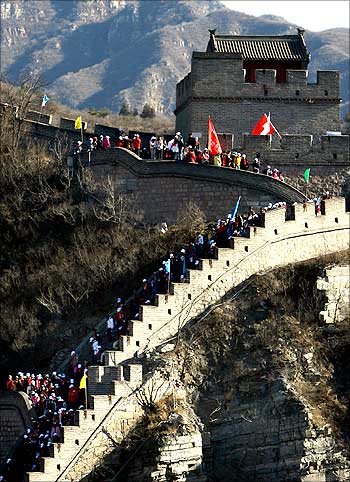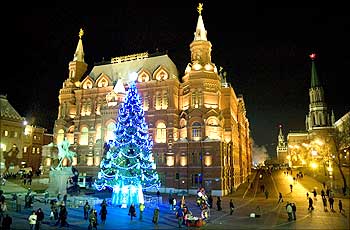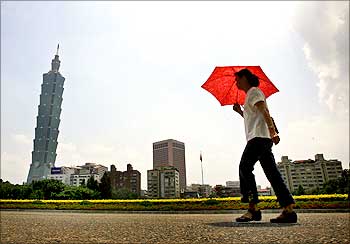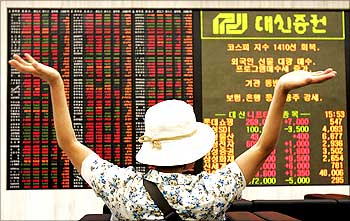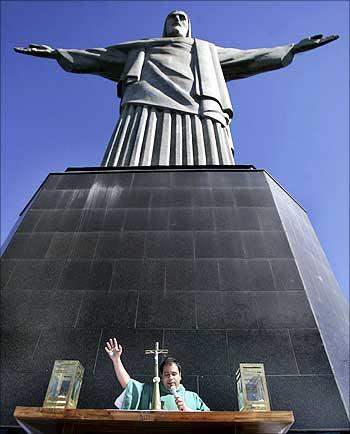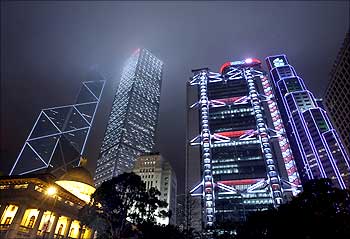 | « Back to article | Print this article |
10 countries with largest foreign reserves
Foreign exchange reserves, often taken as a yardstick to gauge a country's financial strength, are the foreign currency deposits and bonds held by central banks or monetary authorities (it is the Reserve Bank in the case of India).
Forex reserves include a country's gold holdings and convertible foreign currencies held in its banks, including special drawing rights and exchange reserve balances, with the International Monetary Fund. Foreign exchange reserves are used to back a country's liabilities, e.g. the local currency issued and the various bank reserves deposited with the central bank, by the government or financial institutions.
The quantity of foreign exchange reserves can change as and when a country's central bank implements the monetary policy. Large reserves of foreign currency allow a government to manipulate exchange rates -- to stabilise the foreign exchange rates to create a favourable economic environment.
India ranks 5th in the world with a foreign exchange reserves of $262 billion as of June 2009.
So let's find out which are the 10 nations with the largest foreign exchange reserves in 2009...
10 countries with largest foreign reserves
Rank 1: People's Republic of China -- $2.132 trillion
People's Republic of China is the largest country in East Asia and the most populous in the world with over 1.3 billion people, approximately one-fifth of the world's population.
China is the fastest growing major economy in the world. It now has the world's third largest nominal GDP -- 30 trillion yuan ($4.4 trillion). It is a member of the World Trade Organization and is the world's third largest trading power behind the US and Germany.
Analysing China's record foreign exchange reserves growth, economists discovered that luxury home sales in China's big cities saw robust growth in the second quarter. According to analysts, it is mainly because of increased purchase by overseas buyers.
10 countries with largest foreign reserves
Rank 2: Japan -- $1.019 trillion
Japan is the second largest economy in the world, after the United States, with about $5 trillion nominal GDP and third after the US and China in terms of purchasing power parity.
It is home to some of the leading and most technologically advanced producers of motor vehicles, electronic equipment, machine tools, steel and nonferrous metals, ships, chemicals, textiles and processed foods.
Japan's main export markets are the US, European Union, China, South Korea, Taiwan and Hong Kong. Japan's main exports are transportation equipment, motor vehicles, electronics, electrical machinery and chemicals.
The island country's service sector accounts for three quarters of the gross domestic product. Japan ranks 12th out of 178 countries in the Ease of Doing Business Index 2008.
10 countries with largest foreign reserves
Rank 3: Russia -- $401 billion
Russia has the world's largest reserves of mineral and energy resources,and is considered an energy superpower. It has the world's largest forest reserves, too.
It is the world's leading natural gas exporter and the second leading oil exporter.
The economic crisis that struck all post-Soviet countries in the 1990s was almost twice as intense as the Great Depression that hit Western Europe and the US in the 1930s. Russia's GDP was half of what it had been in the early 1990s, even before the financial crisis of 1998 had set in.
However, since the turn of the century, rising oil prices, increased foreign investment, higher domestic consumption and greater political stability have bolstered economic growth in Russia.
The country ended 2007 with its ninth straight year of growth, averaging 7 per cent annually since the financial crisis of 1998.
10 countries with largest foreign reserves
Rank 4: Taiwan -- $305 billion
Taiwan's rapid economic growth post World War II has transformed it into an advanced economy. Taiwan's growth is fondly referred to as the 'Taiwan Miracle'.
International Monetary Fund recognises Taiwan as an advanced economy while World Bank terms it high-income economy. Its technology industry has a major role to play in the global economy.
Taiwanese companies manufacture a large proportion of the world's consumer electronics.
Taiwan is one of the constituent of Four Asian Tigers alongside Singapore, South Korea and Hong Kong.
Today Taiwan has a dynamic capitalist, export-driven economy with gradually decreasing state involvement in investment and foreign trade.
10 countries with largest foreign reserves
Rank 5: India -- $262 billion
India is the seventh-largest country by geographical area, second-most populous country and the most populous democracy in the world.
India's economy is among the fastest growing in the world. It has the world's second largest labour force -- 516.3 million. In terms of output, the agricultural sector accounts for 28 per cent of GDP; the service and industrial sectors make up 54 per cent and 18 per cent respectively.
The International Monetary Fund recently raised India's growth forecast to 5.4 per cent for 2009 and said that the Indian economy is beginning to pull out of a recession.
The country is expected to witness a growth rate of 5.4 per cent in 2009.
The Indian economy is projected to expand at a rate of 6.5 per cent in 2010 while the world GDP is anticipated to grow by 2.5 per cent.
The country is well connected through maritime routes, although it lacks in airports and high-quality roads.
10 countries with largest foreign reserves
Rank 6: South Korea -- $232 billion
South Korea, officially the Republic of Korea, is an East Asian country, located on the southern half of the Korean Peninsula.
South Korea is a presidential republic consisting of 16 administrative divisions.
South Korea is a developed country and a full democracy. It is a high-income Organisation for Economic Co-operation and Development member, having the fourth largest economy in Asia and the 15th largest in the world.
South Korea is a leader in technologically advanced goods such as electronics, automobiles, ships, machinery, petrochemicals and robotics, headed by Samsung, LG and Hyundai-Kia.
South Korea had the world's second-fastest growing economy from 1960 to 1990. However, from 2003 to 2008, South Korea's economic growth rate slowed to fall behind the global average.
The economy slipped from the 11th largest in the world to the 15th largest.
South Korea is classified as a high-income economy by the World Bank and an advanced economy by the International Monetary Fund.
10 countries with largest foreign reserves
Rank 7: Brazil -- $210 billion
The Federative Republic of Brazil is a country in South America. It is the fifth largest country by geographical area, occupying nearly half of South America.
Brazil is the largest national economy in Latin America, the world's 10th largest economy at market exchange rates and the ninth largest in purchasing power parity, according to the International Monetary Fund and the World Bank.
The country has been expanding its presence in international financial and commodities markets, and is regarded as one of the group of four emerging economies called BRIC (Brazil, Russia, Indian and China).
The country is known for its booming agricultural, mining, manufacturing and service sectors, as well as a large labour pool.
Brazilian exports are currently scaling new heights, its major export products being aircraft, coffee, automobiles, soybean, iron ore, orange juice, steel, ethanol, textiles, footwear, corned beef and electrical equipment.
10 countries with largest foreign reserves
Rank 8: Hong Kong -- $186 billion
Hong Kong, a self-governing territory of the People's Republic of China, is a global metropolitan and international financial centre, and has a highly developed capitalist economy.
Its highly capitalist economy has been ranked the freest in the world by the Index of Economic Freedom for 15 consecutive years.
Hong Kong is one of the world's leading financial centres and is one of the Four Asian Tigers. The Hong Kong Stock Exchange is the sixth largest in the world.
Hong Kong's economy was affected by the Asian financial crisis of 1997. The dangerous H5N1 avian influenza also surfaced that year.
After a slow recovery, Hong Kong suffered a setback again because of an outbreak of SARS in 2003.
However, today, Hong Kong continues to serve as an important global financial centre. The Hong Kong dollar has been pegged to the US dollar since 1983.
10 countries with largest foreign reserves
Rank 9: Singapore -- $166 billion
The Republic of Singapore is an island city-state located at the southern tip of the Malay Peninsula.
Since its independence on August 9, 1965, Singapore's standard of living has risen significantly.
Singapore's is an export driven economy and is one of the Four Asian Tigers along with Hong Kong, South Korea and Taiwan.
It happens to be the 5th wealthiest country in the world in terms of GDP per capita.
Foreign direct investment and industrialisation have created a robust economy focused on industry, education and urban planning.
In 2009, the Economist Intelligence Unit ranked Singapore the 10th most expensive city in the world and third in Asia, after Tokyo and Osaka.
The current economic crisis, however, has affected the economy of this island nation to a great extent.
10 countries with largest foreign reserves
Rank 10: Germany -- $144 billion
The Federal Republic of Germany consists of 16 states. The capital and largest city is Berlin.
Germany is a major economic power with the world's fourth largest economy by GDP and the fifth largest in purchasing power parity.
Germany allocates the second biggest annual budget of development aid in the world.
Germany is the world's top exporter and is the leading producer of wind turbines and solar power technology in the world.
The largest annual international trade congresses are held in German cities of Hanover, Frankfurt, and Berlin.
Of the world's 500 largest stock market listed companies measured by revenue, the Fortune Global 500, 37 companies are headquartered in Germany. Some of them are: Daimler, Volkswagen, Allianz, Siemens, Deutsche Bank etc.
Germany is also home to well known global brands like Mercedes Benz, SAP, BMW, Adidas, Audi, Porsche, Volkswagen, and Nivea.
